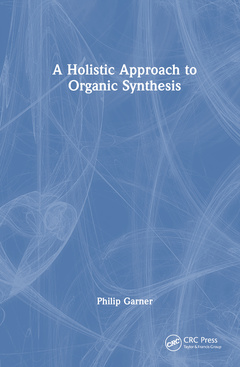A Holistic Approach to Organic Synthesis
Auteur : Garner Philip

Synthesis is one of the distinguishing features of chemistry as a science. It is the synthetic chemist who uses their intimate understanding of molecular structure and properties to produce materials of great value to society. Thus, it is important for students of chemistry to study synthesis and acquire a working knowledge that enables them to address the following question: given a specific molecular target, how does one formulate a plan for its synthesis? This synthesis primer provides students who have taken introductory organic chemistry with a set of tools that can be used to plan a synthesis. It may be used in conjunction with a synthetic methods course, or it can stand alone.
Features:
- Provides students who have taken introductory organic chemistry with a set of tools that can be used to plan a synthesis
- Serves to help organic chemists at all levels to better understand published syntheses
- Focuses on natural products, their complexity, and diverse structures which challenge and inspire the chemists preparing them
- Succinct, readable treatment of important concepts and applications geared towards advanced undergraduates and graduate students
- Each synthesis covered begins with a brief discussion of the target molecule and challenges they present, followed by retrosynthetic considerations
Chapter 1 A Simple Holistic Approach to Planning a Synthesis
Chapter 2 Vying for Control: The Synthesis of Reserpine and Quinine
Chapter 3 A Helping Hand from Nature? Bioinspired Synthesis and Semi-synthesis
Chapter 4 Prostaglandins and Triquinanes: Fertile Ground for Method Development
Chapter 5 Polyketide Synthesis: The Challenge of Acyclic Stereocontrol
Philip Garner received his Ph.D. degree from the University of Pittsburgh under the guidance of (the late) Paul Dowd. This was followed by postdoctoral training in Paul Grieco’s laboratory at Indiana University. In 1983, he took up his first faculty position at the Illinois Institute of Technology in Chicago. He moved to Case Western Reserve University in Cleveland, Ohio in 1985 where he established a research program that focused on methodology for the synthesis of bioactive molecules. In 2007, he moved across the country to join the Department of Chemistry at Washington State University. Over the course of his career, Dr. Garner has trained more than fifty undergraduate researchers, graduate students, and postdoctoral fellows. He has published over 100 papers. His scientific accomplishments include the development of a widely used serinal derivative that has come to bear his name. He currently holds the rank of Professor Emeritus.
Date de parution : 02-2024
15.6x23.4 cm
Date de parution : 02-2024
15.6x23.4 cm



